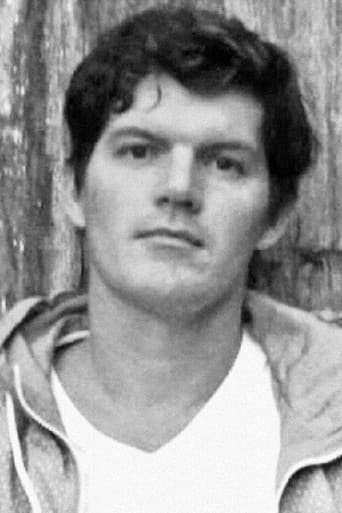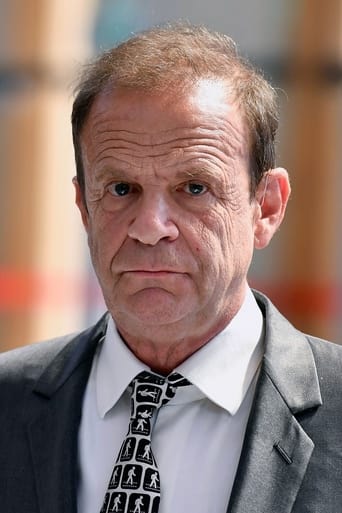Cleveronix
A different way of telling a story
Seraherrera
The movie is wonderful and true, an act of love in all its contradictions and complexity
Billie Morin
This movie feels like it was made purely to piss off people who want good shows
Cheryl
A clunky actioner with a handful of cool moments.
cdcrb
a young man is accused of passing counterfeit French franc notes and is sent to prison. his wife leaves him and his life spirals out of control in way that is totally believable. I kept thinking this could really happen. it's a very simple story, but a complex tale. there are many gaps in the film and I understand that is how the director Robert bresson does things. you are just expected to catch up with what's going on as best you can. it's a film where basic decency turns into monstrous results. it's a lot like Hitchcock. maybe better. one interesting thing I noticed was atm machines in France in 1981. I don't really remember them in nyc that early.
lasttimeisaw
A Venice screening of Bresson's restored final feature, L'ARGENT, based on Tolstoy's short story THE FORGED COUPON, a BEST DIRECTOR winner in Cannes (an honor shared with Andrei Tarkovsky's NOSTALGIA, 1983), it is a rigidly modulated allegory delineates the shocking derailment of a man's moral compass with a provocative tail end.Injustice somberly unravels when Yvon (Patey), a young worker for the gas company, is unwittingly subjected to the receiving end of a counterfeit 500-franc note, which has been circulated from two schoolboys to a photography shop. After being caught using the note, Yvon's normal life starts succumbing to a downward spiral, it would firstly cost his job, then send him to jail as an accomplice of an ill-fated bank robbery, until his young daughter dies when he is locked up and his wife leaves for him to start anew. The tragedy couldn't be more harrowing to a working-class young man, but in Bresson's execution, which the whole feature is almost exclusively shot with a stationary camera, he unerringly fabricates a world of apathy enshrouding a brooding Paris, no off- hand "bonjour" among strangers or family members, attenuated by an almost robotic acting method from his amateur cast, what is projected upon us is a circle of mundane dishonesty and aloofness borne purely out of self-interest, where money, is the only currency that matters, certainly Yvon learns that in a hard way.So, after Yvon finishing serving his time, the only thing on his mind is to wreak revenge to this morally corrupt society with double even treble cruelty, homicide and theft impassively conducted. Ultimately, he perversely exacts his chilling last act of vengeance to a gray-haired woman (Van den Elsen), who is benevolent enough to take him in even after realizing what he had done, and her family, sending up Bresson's flaunting condemnation of the consequences when morality is lost, it also means the doom of humanity.Somewhat hard to swallow for its blatant savagery and waywardly defiant in its characterization and story-telling, L'ARGENT has been pristinely revived with its original luster to be appraised by new audience. At any rate, it strongly attests that Bresson had always been an unmitigated provocateur, from his budding career in 1940s, to his swan song four decades later, who had left a profound imprint on this art form with sheer consistency sans compromising his auteurist fidelity.
Rodrigo Amaro
In the modern jungle of the society presented in Robert Bresson's last film "L'Argent" (The Money) the survival of the fittest gets translated as the survival of the smartest person and the material for that is the money in all of his forms. The one who has the money controls everything, everyone, has the chance to buy and sell everything but men are mortal and they end losing up his/her soul just to have the main thing to survive among the living: money.In his criticism about modern society, Bresson follows several characters involved with counterfeit money made by some bourgeoisie teenagers whose parents don't give all the money they want; and this same money will cause problems to a lot of people including the good guy Yvon Targe (Christian Patey), a simple man, living a regular life with his family until the day he almost gets arrested for trying to spend this money given by him during a business trade. Yvon escaped from being sentenced, but the damage was done. He lost his job, finds another one not so good by helping a friend in a bank robbery but this time he'll go to jail and will lose everything he knew of his previous life. The destiny has some surprises for him and for us while seeing how things will be developed with him and the other characters.The environment and the circumstances of situations changes the man into a different thing; Yvon was a good man before all that happened; after that it's all downhill from him, including more robbery and even some murders. Here's a story about life, the awful pursuit of profit over the weakest, the dumbest (after all, Yvon received the money from the guy at the shop without looking if it was real or not), and how almost innocent pranks turned out to be the deadliest, the most striking events. Interesting also the fact about the wealthy kids who make counterfeit money, ask more money to their parents. One of them has a great taste for suits, steal money from his former boss and then return some part of the money, claiming that he's generous, he'll donate some for the poor. The sense of irony in this moment is incredible.Well directed, well acted and with a good screenplay, "L'Argent" on one hand makes valuable statements about the power of money with a positive simplicity, based on a work from Tolstoy (now, here's a man who really gave away all of his money to preach love among people). On the other hand, the most technical aspect of the film, the narrative makes two films in one that it gets dreary, confusing, and almost without any connection with what we were seeing. I'm talking about the last half-hour that didn't match so great as it could be, but at least Bresson proved his point by the violent reaction of the main character. I believe this conclusion was the reason behind the negative reaction from Cannes audience when Bresson won the award of Best Director, in a tied along with Andrei Tarkovsky with his outstanding "Nostalgia". While Tarkovsky was praised and applauded, Bresson got some boos from the crowd, and Tarkovsky being a great admirer of Bresson complimented, embarrassed the other director (I saw the video with this moment somewhere). It's a very realistic ending but most people simply don't agree with what was showed in this change of moral behavior from such a sweet character. Bresson and his last film tells many great things about the necessary evil money is and its disadvantages. 9/10
MisterWhiplash
On the DVD for the film L'Argent, it's writer/director Robert Bresson says that he dislikes his films being called "works", because he sees each films as being a sort of "striving" or attempt towards something more and more perfect with cinematography and so on, and most specifically to strive towards truth with what's up on the screen. It's an interesting position to see from the film's own creator, because the truth as presented in L'Argent is that really of repression. It's not just the characters, or particularly the actors portraying them, or the deliberate flow of shots in a scene of violence or physical altercation or something that should be run of the mill in a crime movie. It's the society itself, and even in the subtler ways the mechanics of society, of money as well, drive along people, especially when they do wrong. Like other Bresson pictures, L'Argent is interested in man's conscience and what it is to go over the line of what makes one guilty or not based on the cruel fates of such a society, only this time even more restrained and- as the word gets thrown around so often- detached.But I would be a little hesitant to label it outright as detached. Bresson's definitely no Scorsese, let's make that clear, and one's not going to get a camera movement that jolts you in your seat. On the other hand there's a level of low-key engrossment in the material. It's not very easy to get through, to be certain, as Bresson is all about both subtleties and hitting you over the head with the message, although not seemingly so much with the latter. His story comes from a Tolstoy short, and it seems fitting for a man who's masterpiece, A Man Escaped, also dealt with the feelings of dread against a clockwork structure where any and all feeling comes in smaller doses. The protagonist, Yvon, gets handed a twist of fate with some counterfeit money, and gets put to jail after taking a deal on a job that leads to a car crash (perhaps the one and only time, ironically of course, that Bresson probably tried an action scene like this). After a stint in prison, where coming face to face with the man originally responsible for putting him in there via the counterfeit money only brings a sense of loss in lacking revenge, he goes through a murder spree.But a murder spree, of course, as Bresson would only do, where omitted details are all apart of the mis-en-scene and in adding an emphasis on the aftermath more-so than the actual grisly details of what goes on in the moment. There's even a moment towards the end of something out of Sling Blade, only here not so much out of the simplicity of the mind from knowing right or wrong but from the simplicity of being numbed by the experience: the lack of a conscience. Yvon is the kind of criminal that never gets shown in movies, and rightfully so. He doesn't fit into a comfortable mold, and it will be a little sluggish for some viewers, even in an 81 minute running time, to see the usual Bresson tactics going on; likely many, many takes to wear down the already non-professional actors, and this time stuck in a near-rigid control of Bresson's in an emphasis of camera over performance. As one critic pointed out, it's more like 15th century icons than usual 'actors'. And, truth be told, it's not quite as fascinating as A Man Escaped or Pickpocket because of Bresson making it tougher to get into the detachment of the main character (the lack of narration may be attributable to this, or the simple fact that perhaps Tolstoy is a hard literary nut to crack).But as his final film, it's a good "attempt" that does progress ideas about the truth behind criminal acts, and the society that tries, convicts and houses them (there's an great little moment showing how the prisoners have to pick up their suitcases before going into the prison), and how 'normal' citizens also have a kind of repression that comes out in spurts, like with the old married couple who take in Yvon late in the film (the shot of the slap is significant, tying into Bresson's visual scheme of such acts being too easy to show on film). It's an intellectual stimulator, at the least, even as it does resist anything extremely favorable as an emotional effort. It's slightly cold and assuredly dense, but worthwhile for a certain kind of movie-goer.





